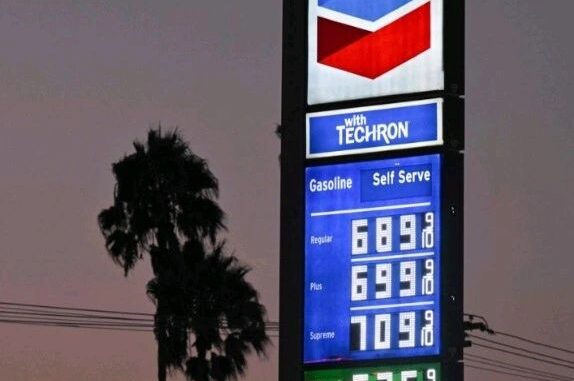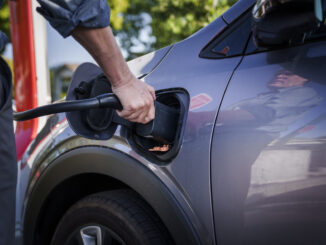
When Europe last year agreed that by 2035 all cars sold in the region would be zero-emissions (read: electric), the most obvious question in my mind was: Who would pay for that?
Because gasoline and diesel vehicles are a great business — not just for the obvious companies, say Volkswagen AG and Stellantis NV, which produce them, or, Shell Plc and TotalEnergies SE, which refine the fuels. But they’re also helpful for another sector that’s often overlooked: European governments, which over the last 50 years have turned internal combustion engines into tax machines.
Last year, the top five European economies1 earned more than €150 billion ($163 billion) from fuel levies, or about 2% of their total tax collection. That money funds a lot of hospitals, schools and the like. In the UK alone, gasoline and diesel duties are expected to raise £24.3 billion ($31 billion) in 2023-2024 — more than what the British government takes from alcohol and tobacco duties combined, or from capital gains tax.
If European governments succeed with their green plans, much of that income will disappear in 25 years. So planning for a replacement needs to start immediately, not only because of the large sums involved but also because of the complexity of any alternative.
Clearly, there are other costs for governments: For example, loss of revenue from registration taxes (which electric vehicles often don’t pay in Europe), plus the outright costs, in some countries, of direct EV subsidies and grants. There are, however, pluses too: less pollution from burning gasoline and diesel, which reduces health and climate-change adaptation costs.
But, to simplify the debate, allow me to focus exclusively on fuel taxes for the moment.
The history of fuel taxation goes back more than a century. In the UK, the first gasoline duty was introduced in 1908-1909. The aim was to finance the enormous expansion of paved roads and highways that new cars needed. Only after the twin oil crises of the 1970s did the priority shift to improving fuel efficiency, and only more recently has it morphed into the battle against climate change.
Whatever their final use, fuel taxes have today five distinctive advantages for governments: They establish a direct link between road usage and payment; they collect lots of money; they are simple and cheap to manage2; taxpayers largely accept them as fair; and finally, they are difficult to evade. The biggest pitfall is they’re regressive: Poor and rich pay the same (and because rich people typically drive newer, more efficient cars, that regressiveness is worse than at first sight).
So how to replace fuel taxes — and when exactly? The timing is crucial for two reasons. First, because tax incentives are still essential for the uptake of electric vehicles; and second, because as gasoline and diesel tax revenue starts to drop, any move to offset the shortfall by increasing fuel duty rates would be enormously regressive since wealthier households are adopting EV cars more quickly than poorer ones. Also, whatever replacement system is adopted should be revenue neutral: It shouldn’t raise more tax than the current system does today.
The transition period from the current fuel duty to whatever replacement is adopted is going to be complicated.
One option is to cast aside taxing driving completely and instead raise revenue for road maintenance and construction elsewhere, say via income taxes. An advantage is that income tax is more progressive. However, such a shift would have a pernicious effect: It would break the link between driving and taxes. Everyone, regardless of how much they use a car — if at all — would have to pay. Even a tax focused exclusively on the ownership of a car, rather than its use, wouldn’t work. Without putting a price on miles travelled, congestion would likely increase, and the incentive to use public transport or buy more efficient cars would disappear.
Thus, a replacement that taxes driving is needed. But that’s easier said than done. With the current fuel duty, taxing the amount of driving is a simple affair: Everyone fills up their car roughly the same way, at the gas station. The more one drives, the more fuel is consumed, the more tax is paid. With electric vehicles, the choices to refill — or charge — are larger, from the home driveway to ultra-fast chargers.
Taxing electricity is an option, but it would make the system more regressive: Typically, wealthier families have driveways in which to charge at home, and thus they can more readily take advantage of cheaper electricity rates or even install solar panels largely devoted to serve the EV. Perversely, those better off could end paying far less tax. Even putting that issue aside, houses would need electricity meters able to measure the consumption of their charging points.
The fairer option is to tax for the actual use of the road, a sort of pay-as-you-drive duty, not so different from the current highway tolls applied in some nations, but covering the whole of the road network. There are several ways to achieve this. One is a once-a-year measure of the total miles driven, with payment spread over the following year. That could be linked to the annual checkup most European countries mandate for cars. Garages would report the miles and the tax authority would issue the corresponding invoice.
Another option is to take advantage of ubiquitous GPS systems — basing taxation on how much, and where, one drives in real time. Of course, this would come with privacy issues. Both miles-driven tax systems could face much higher evasion than the current fuel duty, with tax dodgers manipulating their odometers or GPS systems. The cost for the government of the infrastructure needed to collect the taxes would be also much higher than the current one. Still, I think either system is doable with current technology.
Whatever the solution, one thing is clear: Governments need to start debating what will replace fuel duties. The longer the delay — and the longer electric vehicles remain largely untaxed — the more difficult it will be to introduce a new system.



